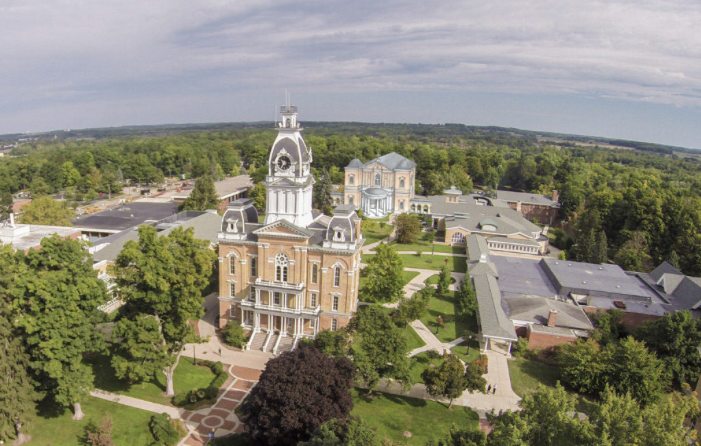
In the past semester, multiple articles in The Collegian have attacked the idea of removing Hillsdale College’s Christian affiliation.
Andrew Simpson wrote a letter on Sept. 7 to the editor claiming secularization denies the “timeless spiritual truths” of Christianity and would endanger free speech. Doyle Wang authored a piece on Nov. 9 arguing that secularization “subject[s] truth to personal feelings” and results in the adoption of progressive ideals.
Secularization would advance the pursuit of truth. Removing Hillsdale College’s Christian label would attract more non-Christian students to campus, thereby enriching religious dialogue.
A religiously diverse student body is desirable because it advances the search for spiritual truths. Increased religious diversity would foster interfaith dialogue among students of both Christian and non-Christian beliefs, resulting in intellectual growth and critical thought essential to liberal education.
Wang asserts that the college already has adequate religious diversity, citing the school’s “variety of faiths” that include “Catholicism, Anglicanism, Calvinism, Lutheranism, Mormonism, and Judaism.” The “variety of faiths” he outlines are, in reality, a variety of Judeo-Christian faiths.
This does not amount to a religious diversity that promotes thinking beyond Christian ideas and therefore limits religious dialogue to a majority Christian perspective.
While Wang is correct in his statement that “the very existence of God can be up for debate here on campus,” how often is such an inquiry genuinely raised on the campus of a school that calls itself Christian? If we are students of the liberal arts, and honestly claim to be pursuing truth, should we purposefully limit ourselves to a Christian perspective?
As demonstrated, secularization is a means by which the college can further pursue truth. Yet both Simpson and Wang argue that secularization would deny “fundamental truths” inherent in Christianity. This is simply not true. By its very definition, a secular institution takes no stance on religious matters. Refusing to take a position on Christianity is not the same as denying its truthfulness.
Wang also boldly claims that secularization appeals to “self-centeredness,” in order to “attack Judeo-Christian values” and to “subject truth to personal feelings” instead of following an objective Christian truth.
Refusing to take a religious stance, however, is not akin to subjectivism. Christianity does not necessarily have a monopoly on objective truth, and it is completely rational to explore other faiths and non-religious beliefs.
Questioning Christian truths is not always based on self-centered emotion. This is not a denial of the existence of universal truth or even a denial of Christian truth. As students, however, we must humbly and honestly consider the idea that we are wrong in what we presuppose the truth to be and pursue truth no matter where it reveals itself.
Similarly, secularization is not an attack on Christian beliefs, as Simpson claims. In fact, Christians would greatly benefit from secularization. Secularization provides a marketplace of ideas that include both Christian and non-Christian beliefs. This allows Christians to spread the gospel to a greater number of non-believers, while at the same time correct their own theological errors when debating non-believers.
As Jefferson states in Query XVII of his “Notes on the State of Virginia,” “Reason and enquiry are the only effectual agents against error… [therefore,] difference of opinion is advantageous to religion.”
Exploring religion through the exchange of ideas rather than having the college presuppose one idea to be absolutely true is a more rational and genuine manner of pursuing truth.
Both authors assert that secularization will lead to “a shift away from free speech” or towards a “progressive education” characterized by safe spaces and trigger warnings. However, the erosion of free speech on college campuses is not unique to secular schools.
The renowned Foundation for Individual Rights in Education provides multiple instances of Christian-affiliated colleges silencing the speech of students and faculty. For example, Catholic-affiliated Villanova University cancelled a workshop held by a gay-rights activist in 2012. In 2016, Fordham University prevented the creation of a Students for Justice in Palestine chapter. In another instance, a faculty member of the College of the Holy Cross forced a secretary to remove an American flag from her office.
The assertion that these issues are created by secularization is false. If anything, the growth of progressive thought on college campuses correlates with secularization, which the critical authors fallaciously interpret as causation.
Secularization is not an attack on or advocacy for any faith. Rather, it is a neutral method by which our college community can more genuinely and effectively pursue the truth, wherever that pursuit may lead.
Blake Estep is a sophomore studying the liberal arts.

